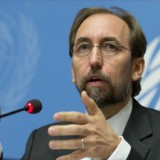 United Nations High Commissioner for Human Rights, Zeid Ra’ad Al Hussein, began his opening address at the 30th session of the Human Rights Council in Geneva by poetically referring to the pivotal image that shocked the world. It was an image that evoked sadness, disgrace and anger. It was the image of Alan Kurdi, lying on the sand, his life consumed by the ocean too soon before he could begin his second chance, not at life, but at living.
United Nations High Commissioner for Human Rights, Zeid Ra’ad Al Hussein, began his opening address at the 30th session of the Human Rights Council in Geneva by poetically referring to the pivotal image that shocked the world. It was an image that evoked sadness, disgrace and anger. It was the image of Alan Kurdi, lying on the sand, his life consumed by the ocean too soon before he could begin his second chance, not at life, but at living.
Concurring that there is no ‘one swift solution’ to the terrors and trauma associated with refugees and asylum seekers, and indeed several other pertinent human rights related issues around the world, the Commissioner urged countries to support their own people as well as those in other countries. He called nations to accept scrutiny and criticisms rather than withdrawing voluntary contributions or refusing to acknowledge those flaws in the system that lead to violations of human rights.
During the three weeks of the session, 47 member states will discuss and receive reports on a variety of human rights issues. The mention of so many countries in his opening address, brings home a realisation of the extent of violations of human rights that are happening all over the world. Detention, interrogation, forced eviction, abuse, sexual exploitation, and corruption are all issues that are in fact far closer to home for many of us than one may have originally expected.
Unsurprisingly, Syria received attention in the opening address as much concern remains following the ongoing violations of the prohibition of chemical weapons, torture and just about ‘every norm intended to protect civilians’. Other issues considered included the detention and interrogation of lawyers in China and the violation of the ceasefire in Mali after the signature of the Peace and Reconciliation Accord. Also receiving mention was the refugee situation in Australia, a system that is failing to meet international standards and continues to restrict independent monitoring of detention for those asylum seekers arriving by boat. The United States was also mentioned, with its immigration policies being the object of shameless political grandstanding and concerns relating to the incessant discrimination against African-Americans.
The Commissioner also voiced concerns for the Ukraine as the United Nations Human Rights Monitoring Mission reported almost 8,000 deaths since the start of conflict last year. Residential areas on both sides of the contact line have been bombed, with only fractional removal of heavy-duty weapons.
As well as mentioning several upcoming conferences, working groups and initiatives, the Commissioner concluded his address by making reference to the cadence of anniversaries beginning one year ago with the end of World War I, following through to the liberation of Auschwitz and the terrors of Hiroshima. All were encouraged, countries, corporations, NGO’s and individuals, to use these stories of our past as lessons for guiding our future. To use our history to drive and empower each of us, to work together to create a world where countries concerns are shared and supported. “Instability is expensive. Conflict is expensive. Offering a space for the voices of civil society to air grievances, and work towards solutions, is free.”
A link to the Opening Statement by UN High Commissioner for Human Rights at the 30th session of the Human Rights Council can be found here.
Thanks to ERI intern Zoya Yukhnevich for this article.